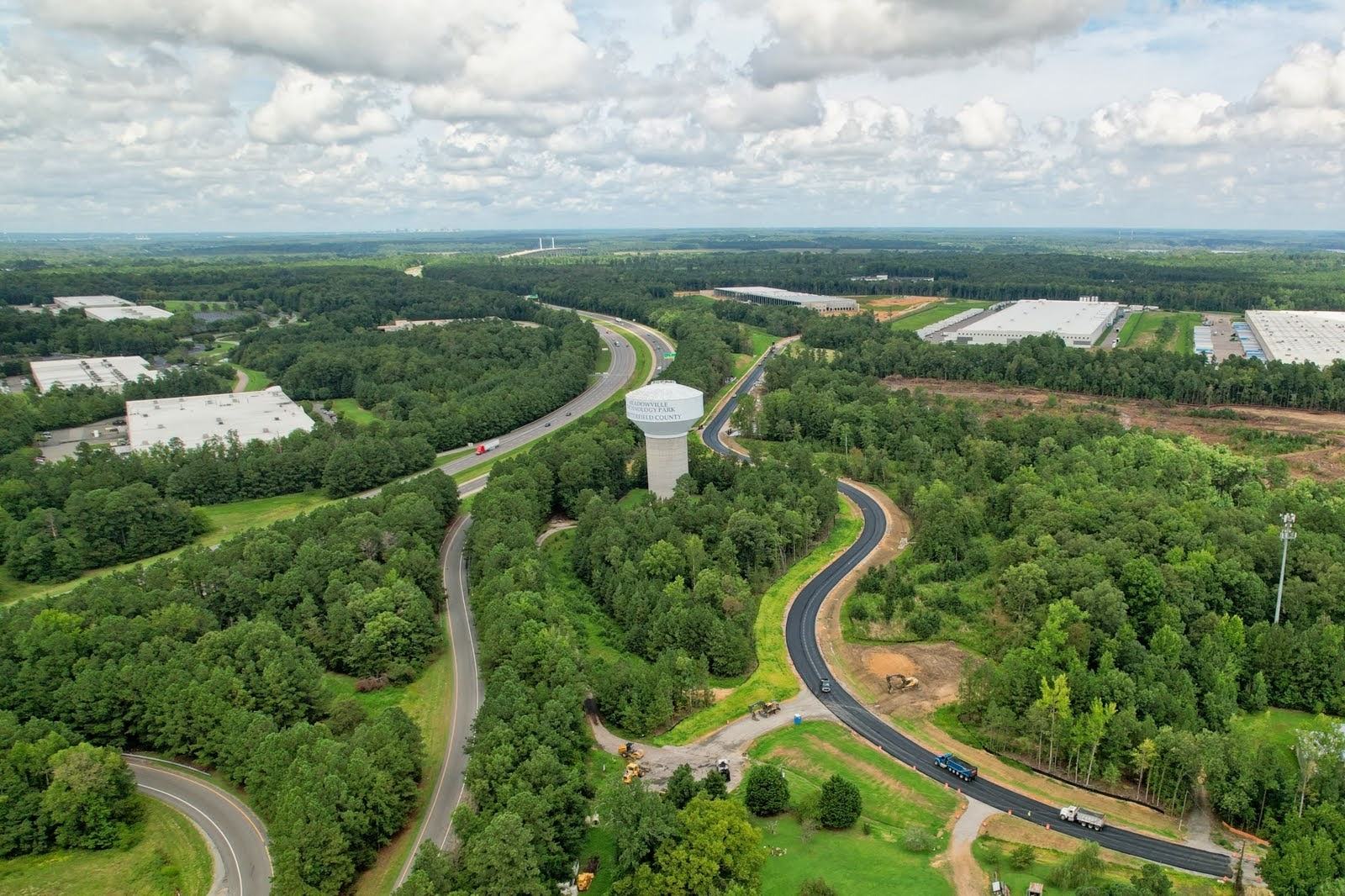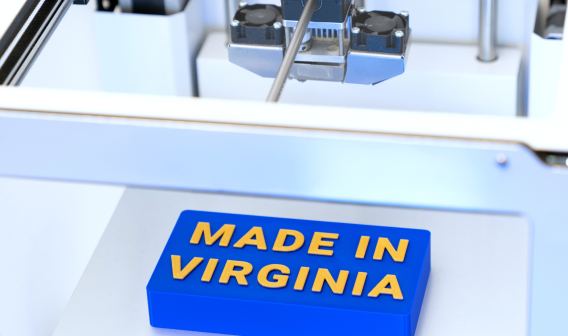Anticipating Manufacturers' Site Needs
Through targeted investment, Virginia looks to prepare project-ready sites for manufacturing projects
If every journey begins with the first step, in Roanoke that first step looks like 40,000 square feet of lab space.
City officials are working to ensure that, in the not-too-distant future, Roanoke will boast a thriving biotech sector with deep roots and connections to the region’s educational and healthcare systems. For now, they’re starting with the BioTech Lab Project: a 40,000-sq.-ft. building retrofitted for lab space for startups; a team of ambitious community leaders to lead the way; $15.7 million in state funding, plus nearly $2 million more in municipal contributions; and a plan to open for business in 2025.
“We call this our proof-of-concept building, but the vision for biotech in Roanoke is much bigger,” said Erin Burcham, president of the Roanoke-Blacksburg Innovation Alliance, a partner in planning and managing the project. “This is a launching point for a commercialized biotech incubator.”
Preparing for Future Investment
Roanoke’s biotech project is one example of how Virginia’s cities, counties, and regions are preparing the land and spaces that will house tomorrow’s industry, from labs designed for tiny startups to megasites that are project-ready for manufacturing and logistical use. The key, officials say, is to make the process of relocating to (or expanding within) the Commonwealth as smooth for business as possible.
“Manufacturers aren’t necessarily looking for everything to be up in a shiny new building to go operate in tomorrow,” said Brett Vassey, president and CEO of the Virginia Manufacturers Association. “But they are looking for sites that are ready and can be up within 12 months.”
Manufacturers aren’t necessarily looking for everything to be up in a shiny new building to go operate in tomorrow. But they are looking for sites that are ready and can be up within 12 months.
That means sites that are prepermitted — in many cases with gas, water, and sewer lines already built in, he said. This philosophy is reflected in VEDP’s Virginia Business Ready Sites Program (VBRSP), which identifies, assesses, and improves industrial sites with at least 50 contiguous, developable acres. Recently awarded $126 million in development grants, the program’s success in funding shovel-ready sites was one of the reasons Virginia was named America’s Top State for Business by CNBC in 2024.
Virginia is investing in site development at substantial levels, with more than $230 million in matching grants awarded in the last two years. Forty-five sites have received funding, and nearly 10,000 jobs have been announced on sites that have received VBRSP grants since the program’s inception in 2015. In 2024 alone, 23 sites representing more than 10,000 acres of developable land are receiving funding from the program.
As far as site consultant Andrew Ratchford is concerned, the money has gone to good use in Henry County’s Commonwealth Crossing Business Centre. Commonwealth Crossing received $22.2 million in VBRSP funding in 2023.
“What they’ve done there is textbook — honestly, it’s nation-leading,” he said.
He ticked off a list of amenities: sites that come graded, access roads paved, utilities installed, and a major railway line nearby with an access spur graded to the center.
Commonwealth Crossing’s developers also provided an extra building, available to all the businesses on the site, which could be used for training or hiring, meetings, or whatever other use a company might require. “That’s something special about that park I don’t see everywhere, and it goes above and beyond,” Ratchford said.

Meadowville Technology Park in Chesterfield County, home to the LEGO Group’s new facility, offers convenient access to Interstates 95 and 295 and The Port of Virginia’s Richmond Marine Terminal.
Helping Companies Avoid Risk
Taken together, the improvements and amenities at the project-ready sites relieve burdens companies often face when building new facilities. The Commonwealth Crossing developers, Ratchford said, “have done everything to get each and every one of those sites ready to go.”
Another site in nearby Pittsylvania County, Southern Virginia Megasite at Berry Hill, isn’t far behind Commonwealth Crossing. Berry Hill received a $6 million state development grant this year.
Not all the sites at Berry Hill are graded yet, Ratchford said, which for companies “presents more opportunity for you to make it your own.”
The Mid-Atlantic Advanced Manufacturing Center (MAMaC) in Greensville County received $8.5 million in VBRSP grants this year to improve its 1,600 acres along Interstate 95 and a CSX rail line. Upper Magnolia Green in Chesterfield County received $13 million to develop its 1,700 acres that the county hopes will attract megaprojects. A couple of hours east, Coastal Virginia Commerce Park in the city of Chesapeake received $35 million in VBRSP development grants in 2024. Now 4,000 acres of flat farmland, the plot abuts the North Carolina line on U.S. 17, convenient to The Port of Virginia’s Hampton Roads facilities.
Virginia’s site characterization program categorizes sites among a range of tiers that indicate site preparedness. Tier 4 and 5 sites are considered “business ready,” meaning a motivated company can often open a facility within 12–18 months of making a site commitment. Virginia is rich in Tier 5 sites convenient to key infrastructure, including smaller, shovel-ready sites attractive to smaller manufacturers.
Wildwood Commerce Park in Carroll County is one of those, with 100- and 25-acre sites adjacent to Interstate 77. Project Intersection, a business and industrial park in the city of Norton, home to EarthLink since August 2024, and Rich Creek Corporate Park in Patrick County are convenient to U.S. Route 58, which connects both sites to interstate highways. Ringgold East Industrial Park in Pittsylvania County has all infrastructure in place and offers Class 1 Norfolk Southern rail access.
Matching Diverse Manufacturers
Virginia’s diversity of locales and properties make it an attractive option for manufacturers, said Scott Kupperman, a Chicago-area site consultant specializing in the food and beverage industry. “Virginia offers coastal areas, mountainous areas, flatlands in the middle. You’ve got a nice mix of interesting places with authenticity to them, many of which are good homes for smaller to mid-size consumer-facing brands.”
One such company, Traditional Medicinals, hired Kupperman in 2019 to help it find a site for a $30 million production facility in the eastern United States. The California-based herbal tea manufacturer looked at a number of states and sites, including a property near Asheville, N.C., but ultimately was won over by what Summit View Business Park in Franklin County had to offer.
Summit View “was a great value for them in a physical setting they really, really liked. They were able to visualize a completed facility that reflected their brand,” Kupperman said.
In addition to the diverse landscape Kupperman mentioned, Virginia offers sites to match a wide range of needs that arise as technologies change and companies grow. The BioTech Lab Project in Roanoke is one example — when complete, the facility will offer labs with shared equipment, office space, an innovation studio, and event space, with the flexibility and capacity to allow for partner growth. “We designed a big lab and then broke it down into smaller labs,” said Bradley Boettcher, innovation administrator for the city. “But if a company comes in and needs more space, we’ll be able to just pop out a wall and refinish it and accommodate somebody that’s larger.”
Run by a partnership of the Carilion Clinic, the Virginia Tech Carilion School of Medicine, and the Fralin Biomedical Research Institute at VTC, the project is designed to generate jobs as well as businesses. That’s because, in addition to engaging with the university community, the project also has partnerships with other local four- and two-year colleges. Virginia Western Community College, for instance, will offer degree and certificate programs to train students for lab work, including a certificate in biotechnology that prepares workers specifically for the kinds of labs the project will house, said Marc Nelson, director of economic development for the City of Roanoke. Those students will be encouraged to continue their education path to bachelor’s or even advanced degrees in the field.
“You could start at the community college, then get a four-year degree at Radford University or Roanoke College, then do your graduate work at Virginia Tech, all in the same community,” Nelson explained. “If you wanted to be involved in the healthcare industry and biotechnology, there’s a way in through the community college that can help you get the skills you need.”
While the local education system provides a roadmap for future biotech workers, the Roanoke-Blacksburg Innovation Alliance will offer concierge assistance to the lab’s tenants. That can include anything from coaching entrepreneurs on how to form their company, to introductions to potential investors and strategies for customer discovery. Burcham said, “We are focused on bringing in all the right types of mentors and coaches and experts to align with building out the startups’ businesses.”



